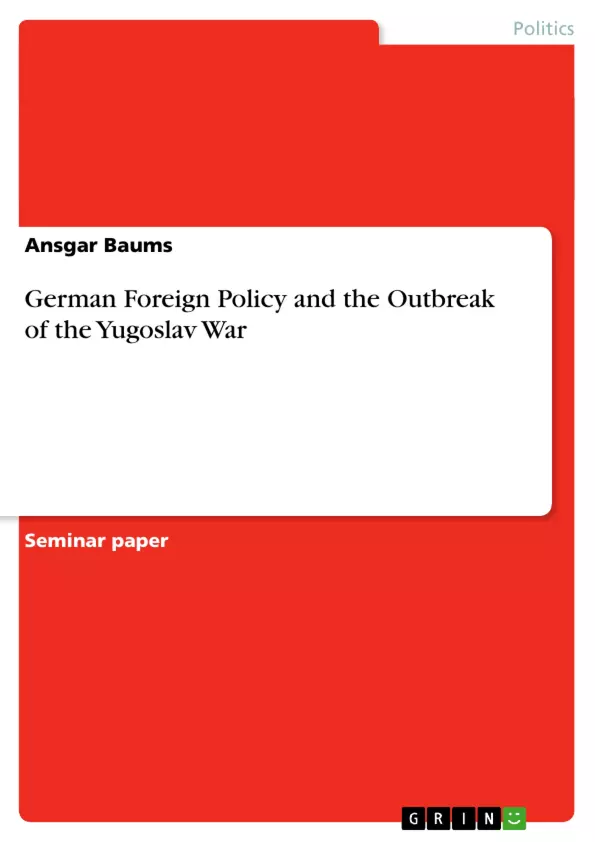In the summer of 1991, Yugoslavia was on fire. Two of the Yugoslav republics – Slovenia and Croatia – had held referendums on independence from Belgrade. In December 1990 and May 1991, the great majority in both states voted for independence. Since August 1991, Germany supported the recognition of Slovenia and Croatia actively. Finally, on the 23rd of December 1991, the German foreign minister Genscher announced Germany´s recognition of Croatia and Slovenia as sovereign states. A long debate about what became known as “recognition policy” followed. Germany´s unilateral recognition was widely criticized as the most profound mistake of German foreign policy since 1945 or – as Horsley put it – “a deadly sin of German foreign policy”. The criticism not only came from the German political left, who accused the Kohl government of a retardation to a Bismarckian Machtpolitik. Even Germany´s closest allies in Europe criticized Germany harshly. The French foreign minister Dumas warned Genscher that a unilateral recognition by Germany “will set Europe back twenty years”. Uncertainties about Germany´s future role in Europe may partly explain the critizism. France and Great Britain were unsure whether Germany would continue its policy of self-restraint or if it would implement a more unilateralist policy, especially towards its new neighbours in the east. Unsurprisingly, only one year after reunification, the question of recognition was perceived as a paradigmatic case of a “new German foreign policy”. Was it the beginning of unilateralist power politics, a mere muscle play or just a diplomatic mistake? It has since become obvious that the unilateral recognition was not the beginning of a “new German foreign policy”. Germany kept on the multilateral track. Today, more than a decade later, Germany is still a driving force behind the integration and enlargement of the EU. Nevertheless, the reasons why Germany acted the way it did, remain unclear. It is not difficult to understand the defection of Germany from multilateral cooperation in December - this is easily explained by a spiral of mistrust between Germany, France and Great Britain. [...]
Inhaltsverzeichnis (Table of Contents)
- Introduction
- Neorealist and Pluralist Approaches to Explain Recognition Policy
- Neorealist Arguments
- Pluralist Arguments
- A Constructivist Perspective of Recognition Policy
- Theoretical Framework
- Norms and Myths in the Discurse on Recognition Policy
- Summary
- Literature
Zielsetzung und Themenschwerpunkte (Objectives and Key Themes)
This work aims to understand the reasons behind Germany's strong support for the recognition of Croatia and Slovenia as independent states during the Yugoslav crisis. The text critically analyzes existing explanations from neorealist and pluralist perspectives, ultimately arguing for a constructivist approach to better comprehend Germany's foreign policy decisions.
- The role of German foreign policy during the Yugoslav crisis
- The debate surrounding Germany's unilateral recognition of Croatia and Slovenia
- The limitations of neorealist and pluralist theories in explaining Germany's actions
- The application of constructivist theory to understand the influence of norms and myths in foreign policy decision-making
- The significance of the myth of reunification in shaping Germany's approach to recognition policy
Zusammenfassung der Kapitel (Chapter Summaries)
- Introduction: This chapter introduces the context of the Yugoslav crisis in 1991, focusing on the independence movements in Slovenia and Croatia and Germany's active support for their recognition. It highlights the controversy surrounding Germany's unilateral recognition and the subsequent criticisms from both within Germany and internationally.
- Neorealist and Pluralist Approaches to Explain Recognition Policy: This chapter examines traditional approaches to explaining Germany's foreign policy, specifically through the lens of neorealism and pluralism. It critiques the application of these theories to the recognition case, arguing that they fail to account for the complexities of Germany's actions.
- A Constructivist Perspective on Recognition Policy: This chapter introduces a constructivist framework to analyze Germany's foreign policy. It emphasizes the role of norms and myths in shaping state behavior, suggesting that Germany's actions were influenced by a prevailing discourse on self-determination that overshadowed other potential concerns like sovereignty or multilateralism.
Schlüsselwörter (Keywords)
This work focuses on key concepts including: German foreign policy, Yugoslav crisis, recognition policy, neorealism, pluralism, constructivism, norms, myths, self-determination, sovereignty, multilateralism, and the myth of reunification.
Frequently Asked Questions
Why did Germany recognize Croatia and Slovenia in 1991?
Germany's recognition was driven by a discourse on self-determination and domestic political pressure, though it was criticized internationally as a unilateral mistake.
What is the "recognition policy"?
It refers to the diplomatic strategy of actively supporting and legally acknowledging the independence of former Yugoslav republics.
How does constructivism explain Germany's actions?
Constructivism suggests that norms (like self-determination) and historical myths (like German reunification) shaped Germany's interests and decisions more than pure power politics.
Why did France and Great Britain criticize Germany?
They feared a "new German unilateralism" following reunification and worried that early recognition would escalate the conflict in Yugoslavia.
Was the recognition a departure from multilateralism?
While the act itself was unilateral, the paper argues that Germany generally remained on a multilateral track within the EU in the following years.
- Quote paper
- Ansgar Baums (Author), 2001, German Foreign Policy and the Outbreak of the Yugoslav War, Munich, GRIN Verlag, https://www.grin.com/document/38740



